Sante
now browsing by category
Personal Holidays
October 4, 2008 was as gloriously sunny Saturday as it is today on October 4, 2025.
I know, because on October 4, 2008 I was supposed to enjoy a day at the North Carolina zoo with my ex-husband. The sun shined and the leaves had just begun to change colors. It was a truly rare Saturday that the ex-husband and I had the opportunity to spend time together. Instead, October 4, 2008 became a day I can never quite forget and that I never really know how to celebrate, Stroke Day.
I last celebrated Stoke day in 2018. It felt like 10 years was enough time to mark, so I did it right. I invited friends to my place in Aberdeen, NC and we had a lovely spread of snacks, and I had a cake made.
It was a great end to the Stroke Day commemorations. So, I didn’t really expect to be writing about it still.
On this Stroke Day, though, I haven’t been able to escape the memories. Maybe it’s the fact that the day is falling on a Saturday again. Maybe it’s the fact that, in a year that has already challenged me and the rest of the nation, yet another challenging event has just begun. The seventeen years since stroke day have taught me the depth of my strength and the boundless capacity of my joy.
So, whether I choose to commemorate it or not, October 4th remains a personal holiday for me. One that reminds me to be as grateful for the struggles as I am for the gifts.
Reclaiming My Body Pt.2
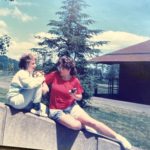
Rowing my millionth meter might not seem like such a milestone to some people. The meter count is a ‘lifetime,’ or however long you’ve been using your Hydrow, total. I’ve never actually rowed on the water or with other people. I’ve never competed. So, I wanted to try to explain how significant this mile stone is for me. As I mentioned, I’ve never been successful at gym memberships, or running, or anything really that involves exercise where I can be seen. As I’ve rowed this last two years and tried to pick out just exactly what it is about it that I have loved, I had an intense realization. I love it, because I can do it alone in my basement, but the athletes and their location make me feel like I am not alone. I can do my workout, feel like a part of a team, and yet, no one can see me.
So much of my recovery from my marriage, and healing from life in general, has been about how feeling invisible wounded me, and how important it has been to let myself be seen and to learn to really see myself. It might seem contradictory for me to be so in love with an activity precisely because it allows me to remain unseen. The dichotomy of my life has always been a sense of invisibility among those who I most long to really see me, and a deeply uncomfortable hypervisibility in public. The sexualization of young girls and fatphobia compounded in my life and created a deep need to control as much as possible how my body shows up in public.
I didn’t have the language to understand it or describe it, but I was about 10-11 years old when I realized my body was no longer my own. Here is a picture of me in that time frame, 1983-4. My family had just moved across the country, leaving all our extended family in Minnesota. All of our belongings packed into a Chevy Malibu station wagon and the trailer my dad built to pull behind it, we left International Falls and headed west. My dad drove the whole way, I don’t remember much about the trip, except that every afternoon we’d stop at some diner for my parents to get coffee and I’d get a piece of pie. I’d always order cherry, because it was my favorite. When I look at this picture, I see what a child I still was. My legs still seem long and like I might get some good height, but I stopped growing taller not long after this. I hit about 5’4″ in 6th grade and just stayed there. It was the year I got those glasses, so it likely felt like some kind of miracle to be able to sit so far way from the TV and still see. The other thing happening in my body, though and you can see that as well in this picture, is that I’d started developing breasts. By they end of this year, I’d be wearing a bra at least one cup size bigger than my mothers.
It was this point that the adults around me started talking about my body. Well intentioned, or at least neutral observations about how early I’d started developing, but also ribald jokes about what such an early start might mean. Just how big would my breasts get? It was also at this point that older kids started commenting on my body in ways I didn’t understand. I remember, being at the school playground one afternoon. I’d either walked back down there to play by myself, or stayed afterschool for a while. I was mostly alone on the playground when two ‘older’ (maybe sixth grade, boys) came to the playground. We were all on some sort of climbing contraption, jungle gym style thing talking, when the tone shifted and they started asking me if I liked cherry pie and if I had some. Remember, that detail about afternoon stops on our trip out west? That was my only understanding of what cherry pie could be. So, I was confused and more than a little frightened by their tone and questioning. It felt like taunting. I knew some how it was about me, about my body, but didn’t understand. I don’t remember how I got out of that situation. I think I just walked away and went home. Given our ages, I am not entirely sure they even fully knew what they were talking about.
By the spring of 1987, I am pretty sure I’d outgrown all the estimates about how far my breasts would develop. Yes, that’s me in the red shirt, with the most terrible hair, but isn’t terrible hair a requirement in 8th grade? By this point, I’d started to understand what made me uncomfortable about the comments and jokes that had progressed to observations about how I must get black eyes when I ran. The boys at school would snap my bra strap, or find some other way to tease me about my breast. I don’t even recall what they would say. My most vivid memory is standing in a biology classroom with some popular boy in front of me, in my space, and asking something I knew to be rude and crude. Again, I don’t remember my reaction, other than my silence and my face burning. This is also the point in time where I know I began to think of myself as big or fat. I began trying to hide my body in the loosest clothes possible.
By high school, that girl in the white shirt, front center in the bottom row, knew she was fat. The social pressure to be thin had kicked in and she knew that her shirts had to be a certain length to help hide her fatness. She’d had plenty of crushes, but very few serious boyfriends and hadn’t really done anything more than kiss a boy. Only one of those boy friends had been from our actual school. The rumor mill, though, it constantly vacillated between the competing theories that I was a lesbian or I was pregnant. I neve could figure that out.
By this point the boys had stopped snapping bras, but the random catcalls on the street had started. The jokes among the adults had changed to innuendos about what would happen when I started dating. Everyone around me was always talking about my body, and I was never allowed to be comfortable in it.
In 1989-90, when I absolutely should have rocked this Wynona Ryder, Heathers, look for Halloween, I never would have dared! This year, though, for my friend’s 80s themed fiftieth birthday party, I dared, even though now I am actually fat. I am small-fat for sure, but still fat. (Small-fat is a fat person who can still wear standard sized clothing.) Daring to choose this outfit that accentuates my breasts and doesn’t hide my fat, and wearing it to the party, demonstrate just how much I have learned to love and accept myself. How I am willing to step out into the world that may invite the comments I have been trying dodge and ignore my whole life.
Many factors play into the fact that I dared to rock this outfit to that party, but my rowing journey is absolutely a huge part of that. Yes, my body had changed a bit over the past two years. I wear slightly smaller sizes. My always already good blood pressure has gone down and is even better, but the weight on the scale at the Dr.s office hasn’t changed much at all. Finding an exercise I enjoy, and that I can do without feeling like I am on display. Has given me the perspective and the strength to resist the incessant fatphobia of American culture and to give myself the compassion and love that everyone deserves. Celebrating my 1M meters, publicly and loudly, means so much to me, because it feels like making my body mine again.
I am still not joining a gym or running in public though. 😉
Reclaiming My Body Pt.1
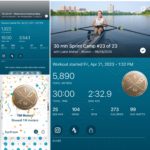
Two years ago, at 47 years old, I took a very expensive gamble on myself. After a lifetime of signing up for YMCA or gym memberships and not using them, or using them only once or twice, and of getting pilates videos, hand me down eliptical machines, and treadmills and then not using them, I bought myself a rowing machine. All through 2020 lock down, I’d seen the Hydrow ads popping up in my social media feeds and thought I would like it. One look at the price, though, immediately put the brakes on any impulse purchases. At that point I didn’t even have a couch yet, I certainly wasn’t going to buy fitness equipment. About a year later, though, couch in place, the world still reeling from Covid, still vascilating between locking down and opening up, I took the plunge and finally order the machine and the whole kit that came with it. (In for a penny, in for a pound.)
I started rowing and within a week of doing those 15 minute sessions nearly every day, I knew this was different. For the first time in my life, I’d found an exercise I loved. From the moment I saw the first ad, I knew the rhythmic nature of the movement was going to appeal to me. Although I do love the rhythmic nature of the rowing, I don’t think any other machine would have captured my heart in the same way. After my intitial Hydrow sticker shock, I looked at sever other machines and seriously debated getting a different model. I am so glad I didn’t though. Look at my face in that picture, after just one week of rowing! I love rowing with Hydrow, because I workout with athletes who are on the water. I see really beautiful places from around the world as I row in my basement. The athletes are genuine and caring. They are motivational as they guide us through workouts and are so clearly working out themselves. When we finish a challenging workout, the athletes are just as sweaty and winded as I am.
Hydrow also motivates users by offering prizes for milestones. After rowing my first 100,000 meters, I got a water bottle, for 250,000, 500,000, and 750,000 meters I got different pairs of socks with the meter totals on the toes. Sure, I paid for those prizes with my monthly subscription fee and sweat, but they were hugely motivating for me. Like I said, I’d never had a workout stick before, I didn’t necessarily know how to set goals, not realistic ones that didn’t involve some kind of weight loss or change in body composition. From the beginning, my only goal was to be stronger and more fit. They are admirable goals, but not exactly measurable. They don’t necessarily allow you to see progress. My hydrow rewards helped me learn how to set smaller goals, ones that I could track and see.
Once I hit 100,000, I knew I was going for the Million Meter club. I didn’t really talk about it until after I made 750,00, but then it became real to me. It wasn’t an ephemeral goal. It was reality, because I already knew I could row the 250,000 meters to get from one goal to the next. “When I hit 1M meters, I’m going to … ” was my new language. It took almost exactly two years from my first row, but yesterday I DID IT! I rowed my one millionth meter. I may have a new definition of what constitutes sweaty, but rowing still makes me smile.
When I realized, after my work out on Wednesday, that I would meet this milestone yesterday, I went back and found my first row summary in order to make this comparison. Of course, once I finished yesterday’s workout, I immediately pulled together this lay out of pictures and blasted it all over my social media, and texted all my friends who wouldn’t see it through public channels! There will also be a party later, in about a month I think. Maybe sooner, now that I have made the mile stone; we’ll see how I feel and how it comes together.
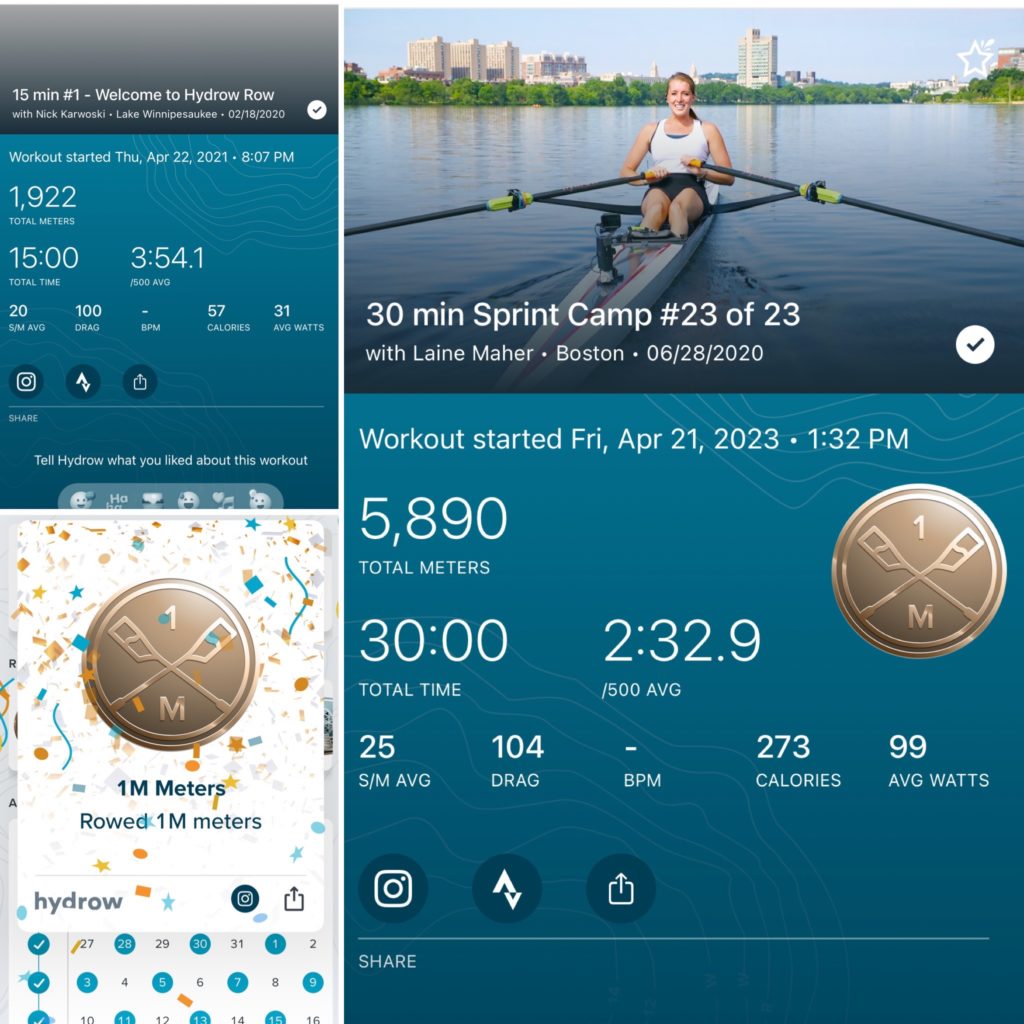
As you can see in the comparison, my million meter row was also the final row of a Spring Training Camp designed to help improve speed. In the fall/winter of 2021, I did the Endurance Training camp which it January of 2022 culminated in a 60 minute row. This spring, as I struggled to get back into the routine and habit of rowing regularly, I decided to give the Sprint Camp a try. It was a real challenge for me, another much smaller gamble on myself, because I really didn’t like rowing at high speeds like 30 strokes per minute (s/m). Five or six sessions in, I almost gave up on it. But, I stuck with it. So, yesterday, in one workout, I accomplished not one, but two rowing goals.
Serendipitously, it was also the perfect row in which to do this. You see, it isn’t just the rhythmic nature of the row that appeals to me, it is also the synchronicity. The way that matching up with the athlete allows you to forget about the big elements of the stroke: legs, core, arms, arms core, legs, and lets you focus on the details: relaxing your shoulders, hands, and face, keeping your posture, breathing. I enjoy working out with all the Hydrow athletes, but matching with some is easier for me than matching with others. For this workout Laine and I gelled. I don’t think my eyes ever really left her hands as she guided me through three 8 minute intervals. I’d turned off the leader board and purposefully ignored all my other metrics, because I knew that if I looked I’d constantly be worried about meeting the distance to make it to 1M. Laine is always super encouraging and breaks down segments so well, but this time the only thing I really remember her saying is, “Repetition breeds confidence.”
I’m fairly certain that anyone who knows me has seen the truth of that statement over the last two years. Repetition bred confidence in my stroke. Legs, core, arms, arms, core, legs sounds simple and straight forward enough, but takes longer than you might expect to really get the hang of. Repetition bred confidence in my persistence. At one point I had a 70 week streak going (meaning I’d worked out at least once a week for 70 weeks). Repetition bred confidence in my recovery. Throughout the hard workouts of both of training camps, I maintained a steady “every-other-day” routine and trusted my body would be ready for the next one. Repetition bred confidence in myself. Sitting down to row, even when I did not want to row, making time to row, even when I did not want to row, taught me how to prioritize myself. Meeting those milestones, using sweat and time to earn my socks, taught me how to manage stress and my mental health.
I am stronger, in every way possible, at 49 than I have ever been in my life. And, in the next post, I will try to explain why and how it took me so long to get to this point. This post is just about the celebration, about the smile on my face after nearly every row, and about how I am so much closer to my RAD friend, who has been my accountability buddy on every step of this journey. Her encouragement has been fundamental to my persistence and success. It’s about looking at the change in my average split from 3:54 to 2:32 and viscerally feeling that progress.
Replenishment
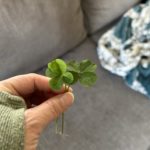
“Mowing” the lawn for the second time this year, I started thinking about my relationship to the it. I don’t care that it is filled with clover. I still get a thrill every time I look down and find a four-leaf one. I pick them to tuck away into that day’s journal entry. I wish for it to be “better,” filled with flowers and prettier or with beds of vegetables and more sustaining. Yet, I only kind of know how to do those things, and the thought of how much work it would take to do them overwhelms me.
As I mowed this time, I tried thinking about what I like about the yard and the yard work. I realized I like what comes after the work. I love being covered in sweat; my shins coated green with lawn clippings, sitting in my lawn chair with a cold beer or water. After the beer, a cool shower to rinse everything off. Getting out of the shower, toweling off just enough not to make a mess, then laying down to air dry. Laying there, feeling the moisture evaporate from my skin, I can concentrate on my breath and think about everything or nothing. The lightness of my room from the sun through the shades, the gentle breeze from the ceiling fan that runs constantly most of the year, almost always combine to lull me into the perfect afternoon nap.
One of the privileges of my life is that, on the weekends at least, I generally have the privilege of napping whenever I want. Napping is actually a pretty good barometer by which to read how my life is going. When I find myself napping too much, I know to check-in with myself because I’m likely a little depressed about something. If I am napping too little, I know to check-in with all my boundaries, because I am likely working or socializing too much. How I talk to myself about my napping tells me when I need to work on my self-compassion practice. (Okay, so yes, I always need to work on my self-compassion practice.) Right now, napping is self-care.
I started practicing self-care before it became a capitalist commodity. Not with naps or even self-compassion, I wasn’t that good at it yet. I started with therapy that was, in my mind, ONLY about finishing my dissertation. In fact, I am pretty sure that woman never saw someone change the subject faster than when she brought up any other part of my life. I wouldn’t have called the therapy self-care at that time, but absolutely was and it led to the second most important piece of self-care I learned. I started keeping what I called The Distaster Notebook. It was thick, black with a soft cover and tiny grid paper. It started life as the place where pre-stroke, I was keeping my comp notes and dissertation ideas. Post-stroke it took a darker, more practical turn. What to do when someone you love is refusing to sign voluntary commitment paperwork. What to do when you have to find a mental health/rehab bed in a fairly isolated, rural, area. By the time I faced the end of the worst times, I had the process down. Get the DH in a safe environment, notify our support systems, find therapy for myself.
Doesn’t sound like self care, but it was. It was because of that notebook that I figured out caregiving 101 essentials like dump out, not in, know what you can control and what you can’t, and that you can’t give if you are empty. If you are care-giving, or being cared for, you have to find someone outside the immediate situation for venting. Knowing what you can control and what you can’t helps you manage your expectations. If you are care-giving or facing any kind of trying time, you have to make sure you do whatever you can to keep your battery full.
Sure, sometimes replenishing yourself means spending money on a new serum or mask for your nightly skin routine. Sometimes it means making time for yoga class, or booking that massage. Too often, though, those are the only ways we talk about self-care. We’ve almost managed to talk it into an empty concept. Sometimes though, and I think they might be the best times, replenishing yourself means taking time to air-dry after a shower, or drinking your morning coffee in the dark and quiet before the day officially begins, or listening to your favorite, saddest, album and singing along (or not), or making time to meet with friends. Most of the time it is some combination of these things.
It gets tempting to call anything we want self-care. To think that self-care is whatever we think it should be in the moment. But, doing that doesn’t benefit us. It generally doesn’t replenish us or reveal what we need to work through whatever has been depleting us. Replenishing is the operative word here. Self-care can be so many things, but in reality its always finding those things and people that replenish us in some way.
Sometimes, when I meet new people and they hear my stories, the stroke, my marriage, the divorce they marvel at how much I have been through or how strong I am. Generally, I deflect their wonder by reminding them how my experience is “not that bad,” other people have been through worse; or, I say something about how its not that special, because if I can do something, any one can do it. What I don’t admit is that it was A LOT. I don’t always know how I got through it. Yes, I am strong, but I am not strong because I got through it. I am strong because I learned how to soften and care for myself, how to be resilient, as I got through it.
As we face the end of semesters, school years, and the space of summer, how will you find the things and people that replenish you?
Homesick? Friend-sick

When I was 9, my dad built a trailer to pull behind our red Malibu classic station wagon. We crammed it and the car full, leaving just enough space for my little brother’s car seat to sit in the middle of the back seat and me next to him. I don’t remember much about that move, because I slept through much of it. My strongest memory of that trip is the afternoon stop for coffee. Wherever we were I would always order the cherry pie. The end result of that trip was our eventual move to Aberdeen, Wa.
For the next thirteen years, if anyone asked me where I was from my first answer was always Minnesota. My logic was that I was born there, and all my extended family was there: my aunts and uncles, older and younger cousins. When I met my cousin for lunch the other day, she reminded me of something else. Apparently, I also used to constantly talk about moving back to Minnesota. Someday I would live here again. Though I don’t remember talking about this in particular, I don’t doubt it is true. Well, after thirty-two years, I have apparently gotten my wish.
As with most wishes this is good and bad.
Now that I am ostensibly “home.” I feel less at home, and more homesick, than I have in a long time. The gift of not having strong ties to particular physical space is that I can general make any place I am feel like home. The problem with this is that my definitions of home are often tied to particular groups of people.
So, while I don’t miss the job, the humidity, the struggles I faced, the decrepit house we lived in, I do miss my Southern friends, my Southern family. Though many of my grad school friends have moved on to their careers other places, the most important were just an hours drive away. My work friends, who I never saw enough of, the most important of whom I could have worked with again this year. My Durham friends, who I saw even less of, but who had just moved less than a mile away. Though not ideal in so many ways, my Durham life had just coalesced in important ways; yet, between May and July I blew it apart.
Certainly missing my friends isn’t the only thing making me feel less than at home in my new location, but it is probably the most obvious and least complicated.
Share Your Story – Planned Parenthood
This week in The Malarkey Bin I followed a link to this article about Why I Can’t Afford Not to Go to Planned Parenthood. It is a powerful, required reading post that also inspired me to tell my own Planned Parenthood story.
In a way my story is a success story. There was a clinic in my home town. It was accessible, and I didn’t have to negotiate protesters or strict security to get to my appointment. It was the early 90s, and the thought that there had been a time when women weren’t able to take control of their health care amazed me. Yes, I was more than a little naive … give an 18 year old a break.
According to Wikipedia in 2010 my hometown had a population of 16, 896 people. Sounds about right, I’d be willing to bet there were a few more when I was growing up, maybe around 18,000? The population isn’t as important as knowing that our town was poor. Built up around an industry that has been dying since before I was born, the town was small, without a lot of diversions for kids. Once you got your license the first thing you did was drive 50 miles east to the State Capital to start hanging out at the mall there, or 20 miles west to the beaches. We may have grown up in the twin shadows of Ted Bundy, he had allegedly tried to pick up a friend’s mom in a bar, and the Green River Killer, still active north and east of us, but I would argue we were the last of a generation of free range kids. From the moment I moved there when I was 10 I was walking all over town. Either 6 blocks from our apartment to the public library, or the longer mile to my elementary school every morning. Before my friends and I got our driver’s licenses, and even after, we would walk all over town.
So, while it wasn’t all terrible, for the purposes of this tale the best image to leave you with is this: when I first heard of the alleged Pregnancy Pact in Gloucester, Ma., the only thing that surprised me about the story was that it happened somewhere other than my home town. Even when I graduated, I’m pretty sure no one got out of our high school without knowing at least one person who had gotten pregnant before graduation. Before I got out of the town for good, the age at which girls were getting pregnant just seemed to be getting lower. My brother, sister, and I joke that the greatest accomplishment in our family was all three of us getting out of that place without having a kid before we were 18. We don’t make that joke at anyone’s expense, many of the young parents we know are some of the best parents we know, and when you are young in our home town there is not a lot to do outside the backseat of a car. If it weren’t for the Planned Parenthood clinic in our town, I don’t think I could even estimate the number of teen pregnancies we would have seen in my high school.
Right now, you are probably imagining a much different story than the mundane one I am about to tell. Although I’d contemplated it for a couple of years before, it wasn’t until I had graduated from high school that I visited our clinic. The funniest part about high school for me was that by the time I graduated I knew that at least twice rumors had spread that I was pregnant, and at least once there was a conflicting rumor that I was a lesbian. It was all amusing to me because I was pretty sure I was the only person I knew not sexually active.
What lead me to Planned Parenthood? I’d read that when a woman turned 18 she needed to have her first Pap Smear, so I made an appointment. I also wanted birth control pills to regulate my periods and alleviate my cramps. My cramps were so bad that I routinely took 3 – 4 Advil at a time just to get through the days that I had them. I was still working part time at a grocery store without health benefits. Planned Parenthood was the only place I could afford to go for standard health care. My story isn’t dramatic, but illustrates a point often lost in the current war on reproductive rights.
Planned Parenthood is essential to all aspects of women’s health care.
What is your Planned Parenthood story?
What I learned this week:
The last couple of weeks have been phenomenally busy at work, but it’s not like I didn’t know they would be. Much like all my instructor friends know the last few weeks of the semester mean spending all their time in grading jail, I know the first couple weeks of the semester mean spending all my time doing the “Come to the Writing Center” dog and pony show. The goal is that by the end of the 2nd and 3rd weeks of the semester someone (90% me) visits all the English 100 and 101 classes. Yes, Virginia, at a school with an undergraduate population twice as big as that of your home town, that is A LOT! You know what else it is? It is exhausting.
Yes, I do this every semester. Yes, I know it is coming. There just isn’t anyway to prepare for the amount of energy it takes to give a 10 minute monologue to different audiences 3 times an hour. In a way it is like grading jail, just front loaded.
Surprisingly, this post isn’t really about complaining. I know. Shocker. It’s about what I’ve come to realize, over the last two weeks.
- If I ever have a nervous break down it is going to happen in the middle of one of these visits. I’ll be in the middle of the “Here’s why you should use our service” spiel, and I’ll just throw up my hands and walk out. I may or may not mutter obscenities under my breath.
- This is the semester that the consultants put together a welcome video that we can shop around to hopefully lessen the number of human visits. I’ve given them no choice, and a deadline of April 15th.
- Oddly enough, when that happens I plan to use that time to start a classroom visit campaign to another set of classes. Have we discussed my masochistic nature? I’m pretty sure we have.
- If I ever finish the dissertation, and get my ‘real’ degree, I’m going to have some serious soul searching to do about whether or not this is the place for me.
- Also, I’m pretty sure you know you are a writer, when not writing/writing very little for two weeks gives you ulcers.
Really, all this week I’ve had stomach issues of one kind or another. Today they culminated in dull pain every time I ate. So, for the next week or so it is all bland food/and herbal tea for me. The caffeine headache ought to kick in tomorrow afternoon in the middle of a writing binge fest.







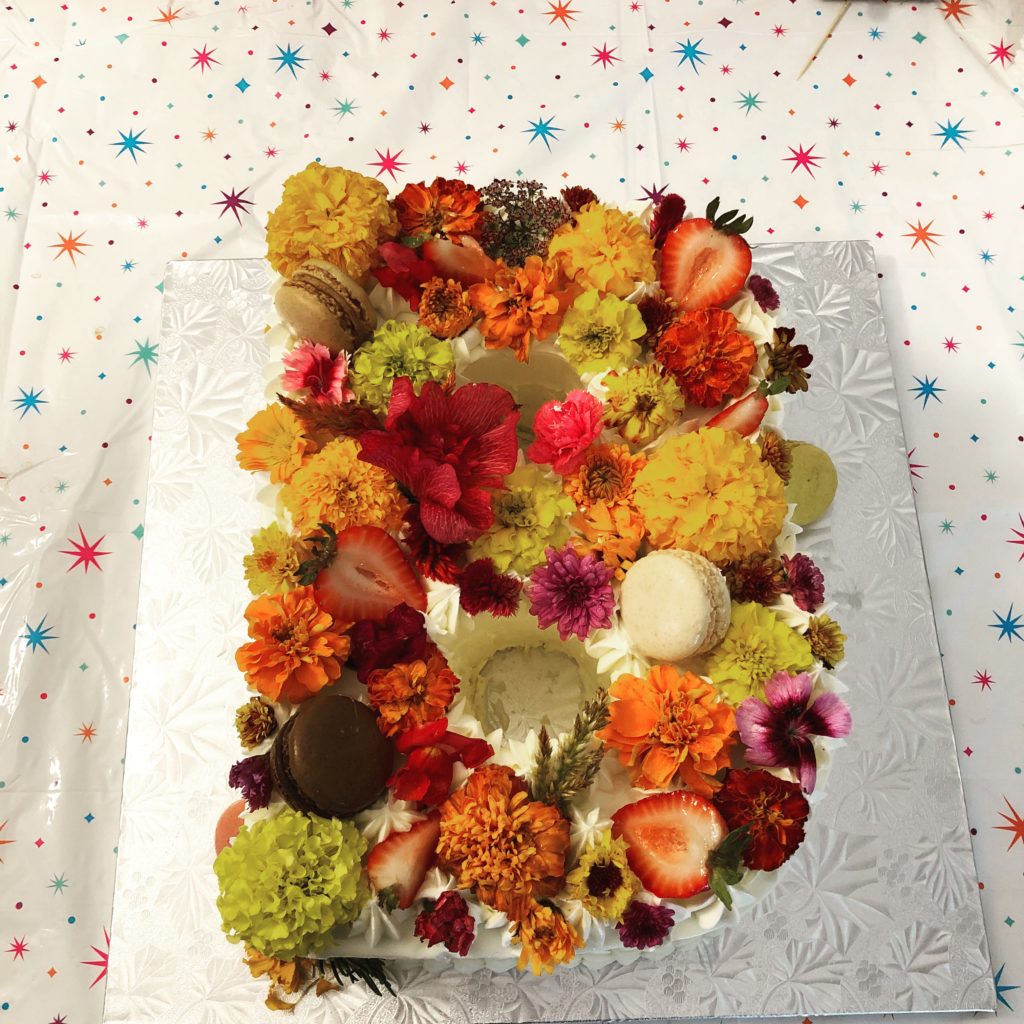

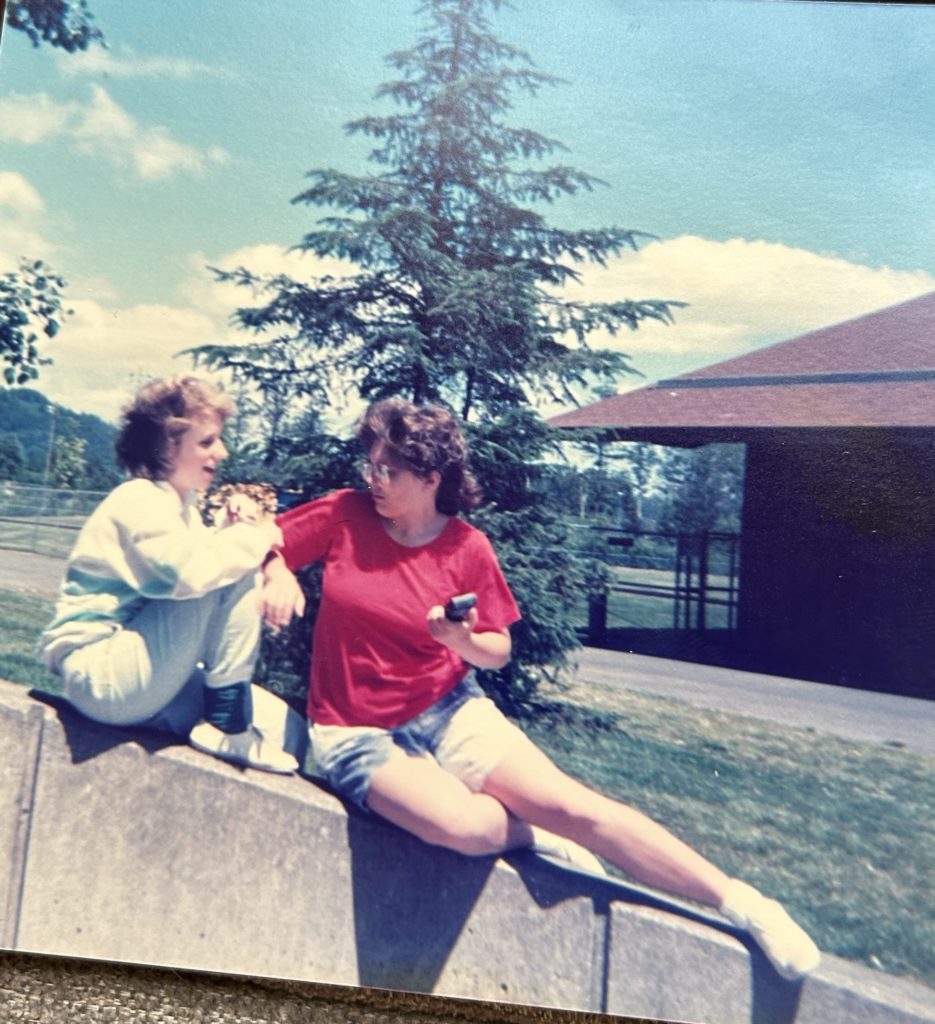

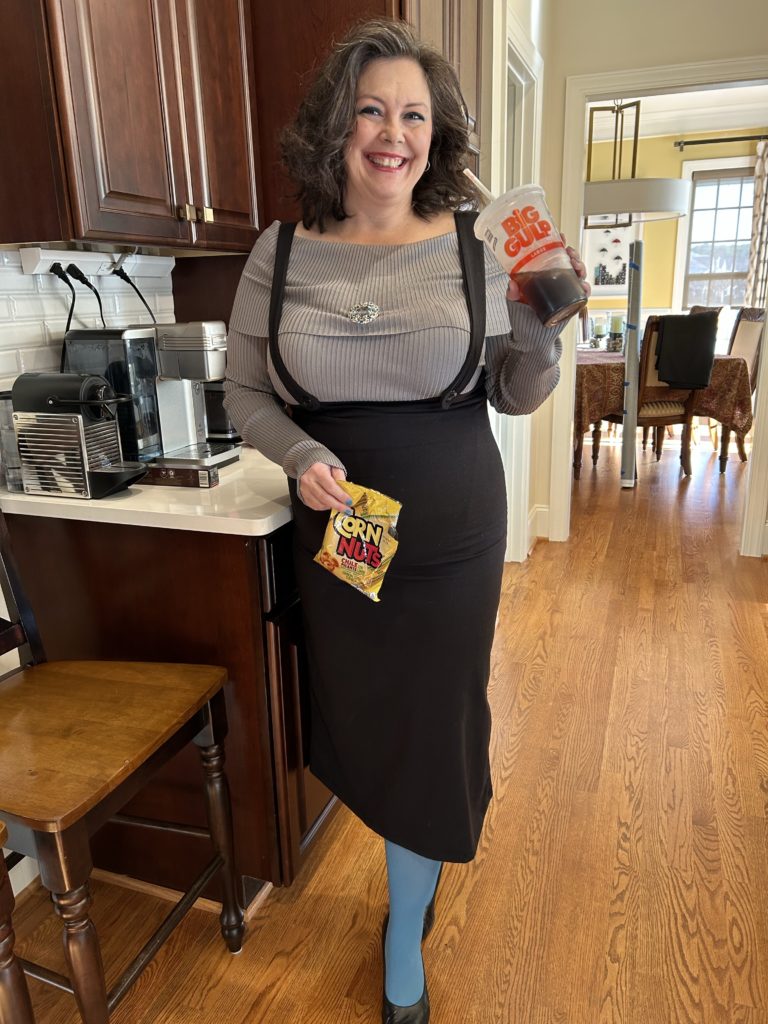
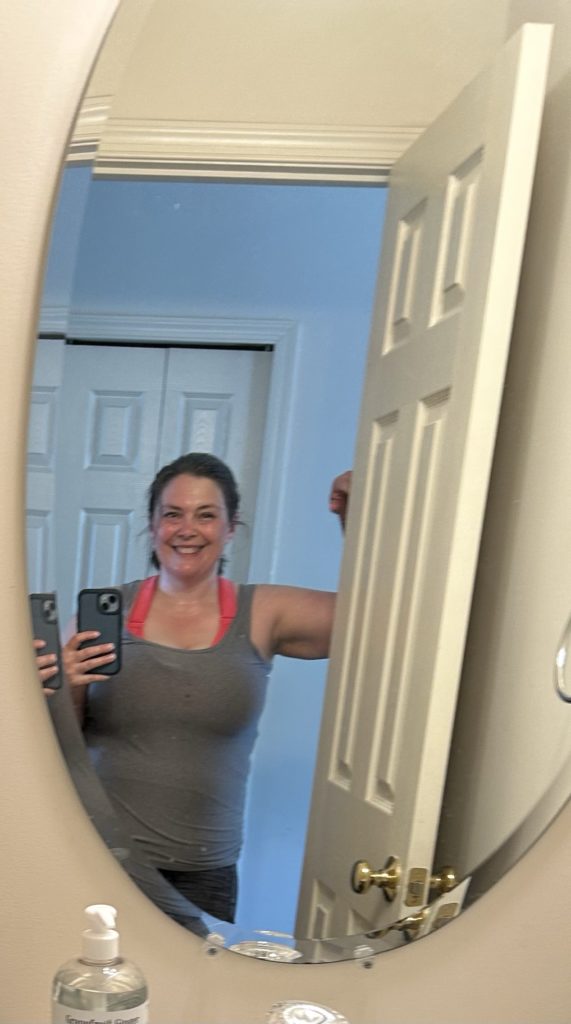
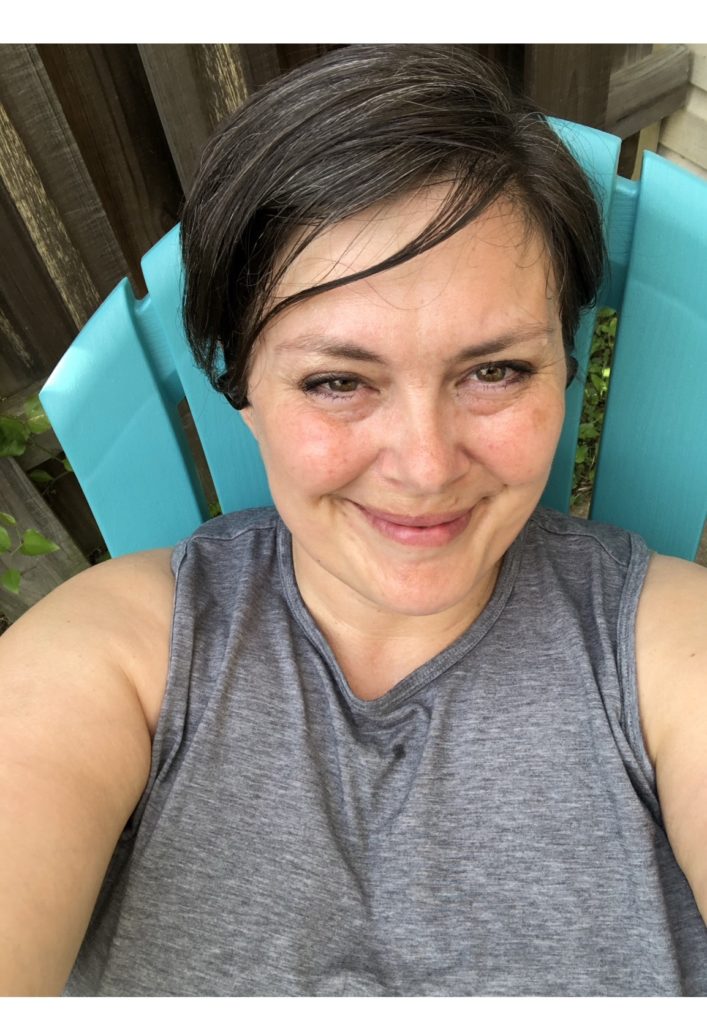
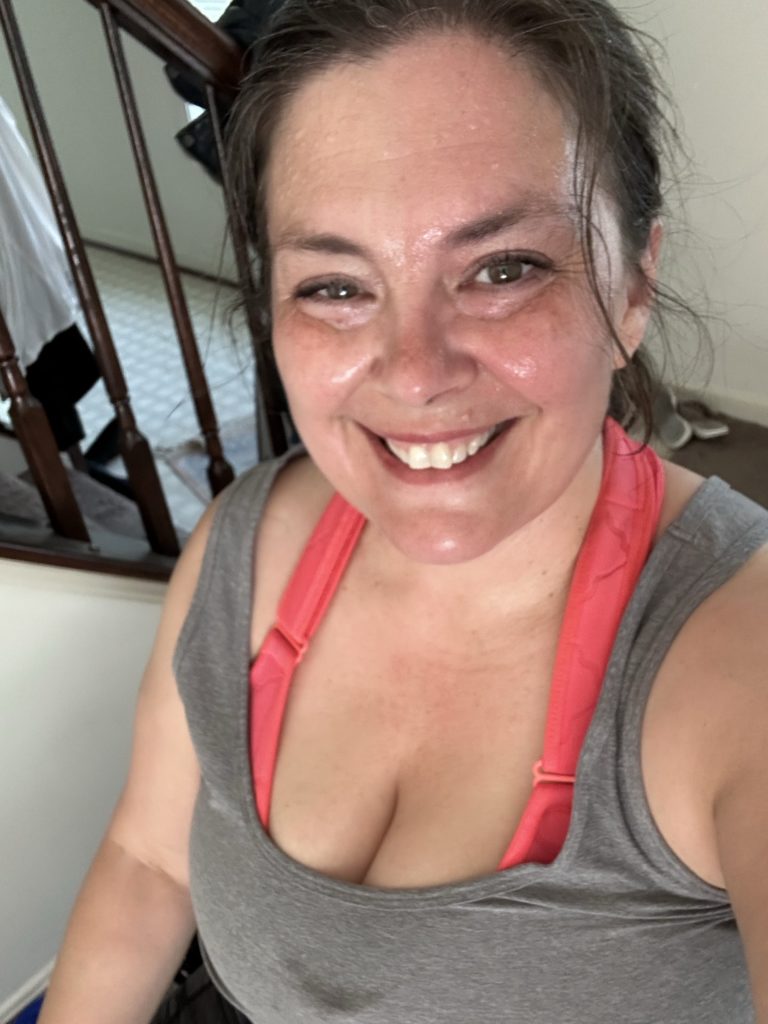
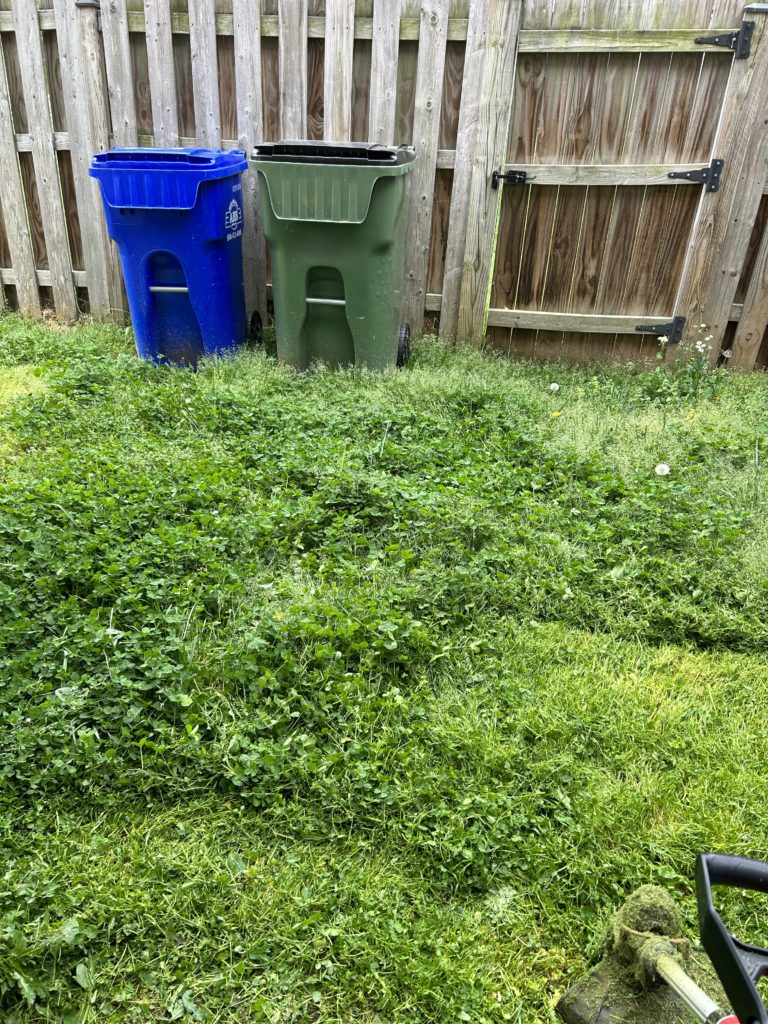

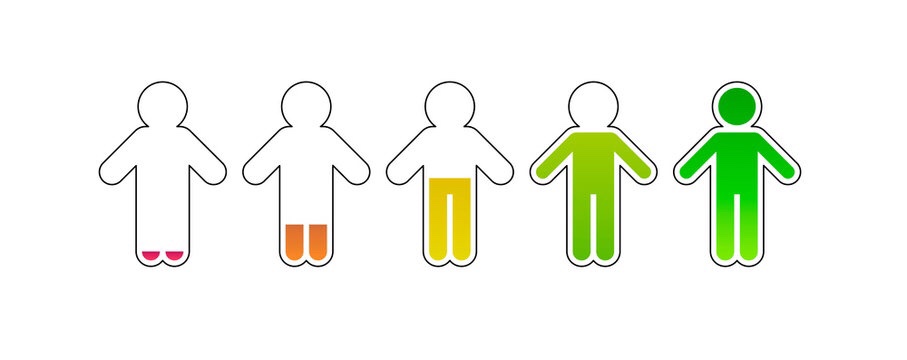

 D5 Creation
D5 Creation